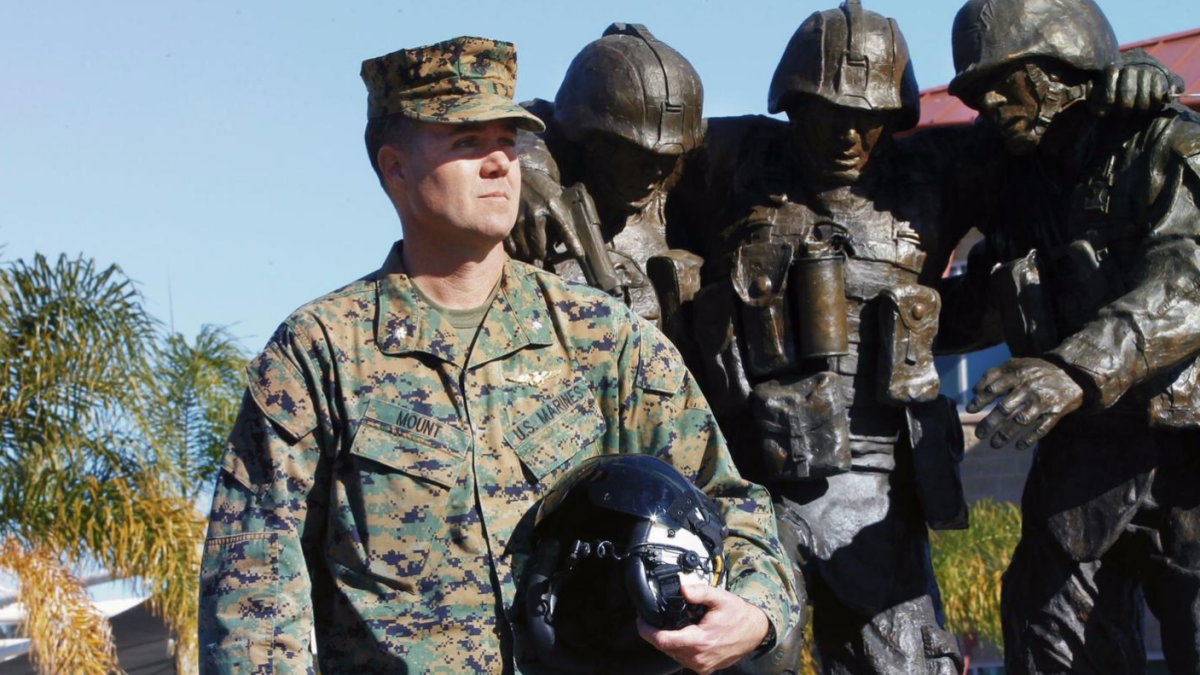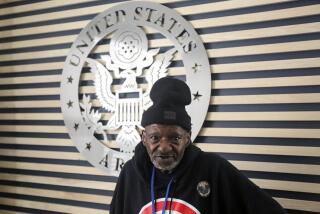Turning Christmas season into an act of service to help wounded warriors at Camp Pendleton

- Share via
Blinded, slumped next to his crumpled chopper at the foot of Iraq’s Najaf cemetery, Stephen “Slade” Mount cupped his gun-shot face.
He knew he’d never pilot a Huey again. But he never could’ve predicted on that brutal day in 2004 that he’d recover sight in one eye, carve out a long career in the Marine Corps and come to think — in a strange but comforting way — of his terrible wound as a kind of gift.
“I actually became a better Marine officer,” the Southern California native said.
For the past six months, Lt. Col. Mount, 43, has commanded Wounded Warrior Battalion West’s glistening $75-million campus at Camp Pendleton, plus satellite detachments at the San Diego Naval Medical Center and the Marines’ air station at Kaneohe Bay, Hawaii.
In the dwindling days of December, as the barracks grow quieter with the sick and injured jetting home on holiday leave, Mount said the Christmas season can be lonely for those left behind. But he pointed to a pair of combat veterans — Master Sgt. Howard Tait and Staff Sgt. Danielle Pothoof — as Marines who help raise morale, in part because their suffering helped to make them compassionate servant leaders.
All devout Christians, these three Marines see the season as more than about their faith. It also reminds them that their savior’s life and suffering should guide their lives year-round.
“Yeah, my dream was to be a pilot and I was good at being a pilot. And then my dream was taken from me,” Mount said. “I had that realization that I wasn’t going to be a pilot anymore. I could get out of the Marine Corps, or I could continue to serve. So I continued to serve.”
On Aug. 5, 2004, Mount wheeled his Bell UH-1N Twin Huey over the city of Najaf’s vast Shiite cemetery, where Jaish al Mahdi insurgents would hide and pop up to pepper U.S. troops and Iraqi police with gunfire.
The police station near Revolutionary Circle had come under attack, and so had U.S. forces that came to its aid.
Mount remembers hearing a blast while flying “really low” during a run over the tombs. Guerrillas had aimed in front of the helicopter’s path and fired.
A round pierced Mount’s flight helmet, entered behind the bridge of his nose, bored through his socket and tore out his right eye.
His hand jerked and the chopper lurched downward. Mount’s co-pilot, Andrew “Smithers” Turner, leveled off the helicopter and tried to gain altitude, but it belly-flopped onto a parking lot and skidded across a courtyard.
The war was over for Mount, a veteran of multiple combat deployments to Afghanistan and Iraq.
Surgeons operated on him in the capital of Baghdad. Then came more treatment in Germany and the naval hospital in San Diego.
“They told me I had to sign some paperwork, which was weird,” he said. “You’re in a surgical hospital and you have to sign some paperwork to acknowledge that they’re going to take your eye out. But there wasn’t any eye left. It was all just mush.”
A string of surgeries closed Mount’s wound, fused his sinuses and snipped the scar tissue binding his jaw muscles.
There were no wounded warrior units when Mount came home to his wife, Stephanie. No concussion therapy. No counseling.
“I filled out a checklist. My time with a psychologist was, maybe, five minutes,” he recalled.
The wars in Afghanistan and Iraq drag on, but far fewer Marines now deploy there. In turn, the ranks of the sick and injured in Mount’s command have plummeted.
Today, the Corps counts about 250 patients under his wing — half the number from only five years ago, when 60% had Purple Hearts.
These days, 90% of the members in his battalion will never go to war. They go home, usually after spending less than a year in Mount’s command.
“But everyone carries their own baggage from their experiences,” he said. “I need to show empathy to guys who are here who never deployed, who possibly weren’t even injured in a training accident.”
And the empathy comes from remembering his own recovery process — and all the help his commanders gave him.
“I try to lead by example,” Mount said. “I try to lead by being around, by being visible, by showing guys that I’m a normal person just like them.”
Prine writes for the San Diego Union-Tribune.
Twitter: @CarlPrinetweets
More to Read
Sign up for Essential California
The most important California stories and recommendations in your inbox every morning.
You may occasionally receive promotional content from the Los Angeles Times.










